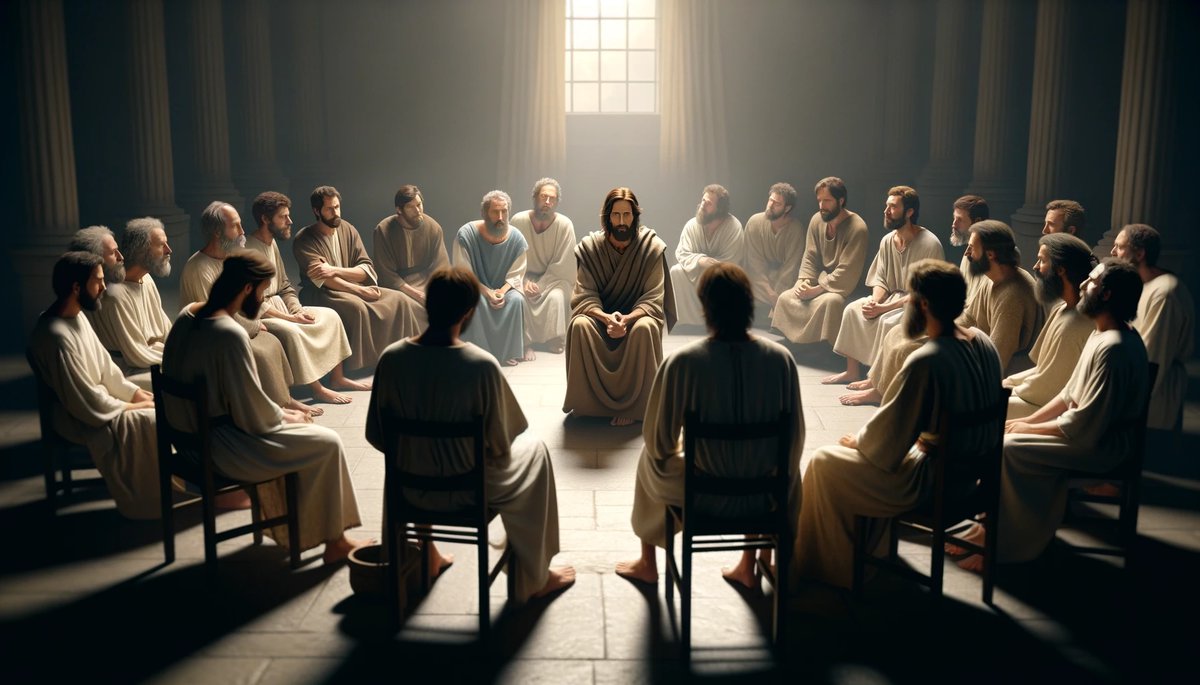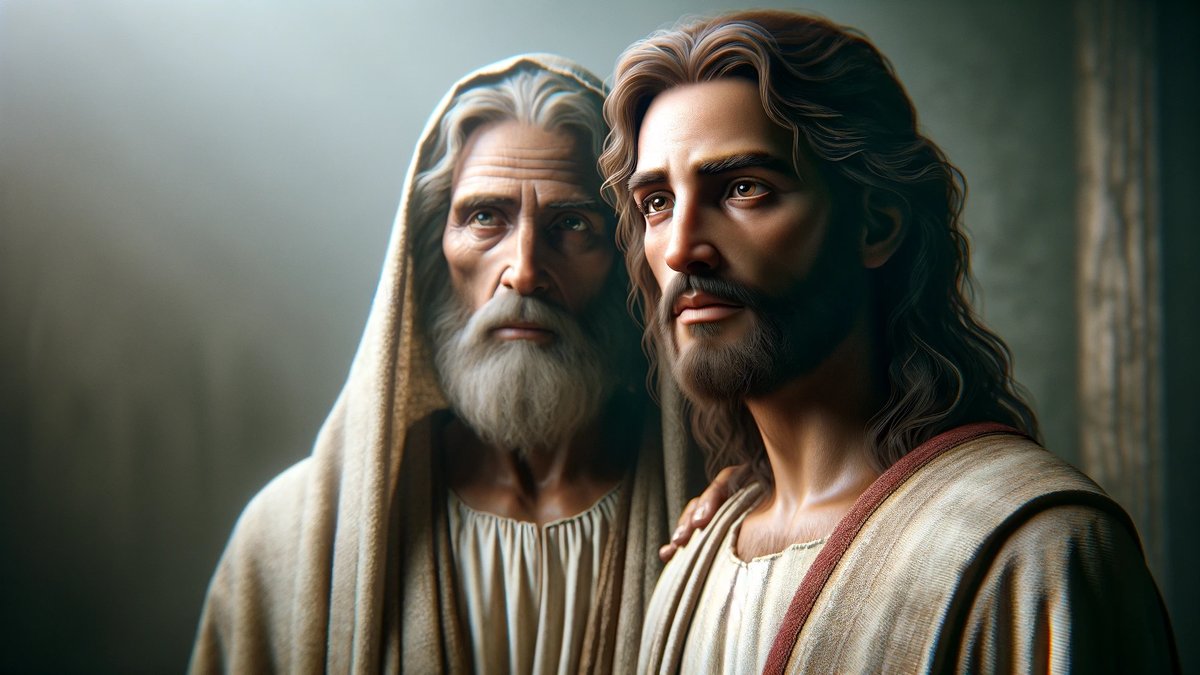Home>Theology and Spirituality>Who Are The Parents Of John The Baptist In The Bible


Theology and Spirituality
Who Are The Parents Of John The Baptist In The Bible
Published: February 22, 2024
Peter Smith, Editorial Director at Christian.net, combines deep insights into faith, politics, and culture to lead content creation that resonates widely. Awarded for his contributions to religious discourse, he previously headed a major organization for religious communicators, enhancing dialogue on faith's societal impacts.
Discover the parents of John the Baptist in the Bible and explore their significance in theology and spirituality. Delve into the biblical narrative and gain insights into this pivotal aspect of Christian history.
(Many of the links in this article redirect to a specific reviewed product. Your purchase of these products through affiliate links helps to generate commission for Christian.net, at no extra cost. Learn more)
Table of Contents
Introduction
The story of John the Baptist is a captivating and significant aspect of biblical history. John's birth and life are intertwined with divine prophecy and the fulfillment of God's plan. Understanding the background and lineage of John the Baptist provides valuable insights into the intricate tapestry of the Bible and the spiritual significance of his role.
John the Baptist is a central figure in the New Testament, revered for his pivotal role as the herald of Jesus Christ. His birth was foretold by the angel Gabriel, setting the stage for a miraculous and awe-inspiring narrative that continues to resonate with believers around the world. Exploring the lineage and parentage of John the Baptist sheds light on the divine orchestration of events and the profound spiritual implications embedded within his story.
As we delve into the details surrounding John the Baptist's parents, Zechariah and Elizabeth, we uncover a tale of unwavering faith, divine intervention, and the fulfillment of ancient prophecies. Their journey serves as a testament to the enduring power of God's promises and the profound impact of their son, John, on the course of religious history.
The narrative of John the Baptist's lineage and the circumstances surrounding his birth lay the foundation for a compelling exploration of faith, prophecy, and the intricate connections between the Old and New Testaments. By delving into the lives of Zechariah and Elizabeth, we gain a deeper appreciation for the divine intricacies that shaped the arrival of John the Baptist and his pivotal role in preparing the way for the Messiah.
In the subsequent sections, we will unravel the prophecy of John the Baptist's birth, explore the lives of his parents, Zechariah and Elizabeth, and examine their profound impact within the biblical narrative. Through this exploration, we will gain a richer understanding of the spiritual significance of John the Baptist's lineage and the remarkable events that surrounded his entrance into the world.
Read more: Who Is John The Baptist In The Bible
The Prophecy of John the Baptist's Birth
The prophecy of John the Baptist's birth is a remarkable testament to the divine orchestration of events within the biblical narrative. The anticipation of John's arrival was foretold centuries before his birth, setting the stage for a profound and transformative chapter in religious history. The prophecy of John the Baptist's birth is intricately woven into the fabric of Old Testament scriptures, establishing a seamless connection between the ancient prophecies and their fulfillment in the New Testament.
The prophecy of John the Baptist's birth can be traced back to the book of Malachi in the Old Testament, where a profound declaration sets the stage for the arrival of a significant figure. Malachi 3:1 states, "Behold, I send my messenger, and he will prepare the way before me." This prophetic utterance foreshadows the emergence of a messenger who will pave the way for the coming of the Lord, heralding a new era of spiritual significance.
The prophecy gains further clarity in the book of Isaiah, where Isaiah 40:3 proclaims, "A voice cries: 'In the wilderness prepare the way of the Lord; make straight in the desert a highway for our God.'" This prophetic announcement reinforces the anticipation of a messenger who will prepare the hearts of the people for the imminent arrival of the Messiah.
The culmination of these prophecies finds fulfillment in the New Testament with the angelic visitation to Zechariah, John the Baptist's father. In the Gospel of Luke, the angel Gabriel appears to Zechariah in the temple, announcing the miraculous conception of a son who will be named John. The angel declares that John will fulfill the prophecies of preparing the way for the Lord, embodying the long-awaited messenger foretold in the scriptures.
The prophecy of John the Baptist's birth serves as a testament to the continuity of God's divine plan throughout the ages. It underscores the meticulous fulfillment of ancient prophecies and the profound significance of John's role as the herald of Jesus Christ. The convergence of Old Testament prophecies with the events surrounding John's birth exemplifies the intricate tapestry of divine providence, weaving together the threads of anticipation and fulfillment in a breathtaking display of God's sovereignty.
The prophecy of John the Baptist's birth stands as a testament to the enduring faithfulness of God and the seamless continuity of His redemptive plan. It serves as a poignant reminder of the divine precision with which God orchestrates the unfolding of history, culminating in the fulfillment of His promises through the birth of John the Baptist, the herald of the Messiah.
The Parents of John the Baptist: Zechariah and Elizabeth
Zechariah and Elizabeth, the parents of John the Baptist, occupy a profound and revered place within the biblical narrative. Their story epitomizes unwavering faith, divine intervention, and the fulfillment of God's promises. Zechariah, a priest of the division of Abijah, and his wife Elizabeth, both descendants of Aaron, are portrayed as righteous and devout individuals who walked blamelessly in all the commandments and statutes of the Lord. However, they were childless, and Elizabeth was barren, a source of deep sorrow in a society where bearing children was highly esteemed.
The couple's advanced age further compounded the improbability of conceiving a child, yet their unwavering faith remained steadfast in the face of adversity. It was within this context of longing and faithful devotion that the angel Gabriel appeared to Zechariah while he was performing his priestly duties in the temple. Gabriel delivered the astounding news that Elizabeth would conceive and bear a son, who would be named John. This miraculous announcement was met with incredulity by Zechariah, prompting him to question the angel's proclamation. As a result of his disbelief, Zechariah was struck mute until the fulfillment of the angel's words.
The miraculous conception of John the Baptist in Elizabeth's advanced age serves as a testament to the divine intervention and the fulfillment of God's promises. It symbolizes the restoration of hope and the manifestation of God's extraordinary power in the midst of human impossibility. Zechariah and Elizabeth's journey exemplifies the profound truth that nothing is impossible with God, and their unwavering faith in the face of seemingly insurmountable odds serves as an enduring example of trust and obedience.
The birth of John the Baptist brought immense joy and wonder, not only to his parents but also to all those who heard of the miraculous circumstances surrounding his conception. The naming of John, as instructed by the angel, signified a break from tradition and a divine affirmation of the child's unique role in fulfilling the prophecies of old. The naming ceremony, where Zechariah's speech was restored, further underscored the divine orchestration of events and the profound significance of John's birth.
Zechariah and Elizabeth's unwavering faith, their miraculous conception of John the Baptist, and the divine fulfillment of ancient prophecies stand as a testament to the enduring power of God's promises. Their story serves as a poignant reminder of God's faithfulness and the extraordinary ways in which He works through the lives of those who trust in Him. The remarkable journey of Zechariah and Elizabeth as the parents of John the Baptist embodies the timeless truth that God's timing and His plans far exceed human understanding, culminating in the fulfillment of His redemptive purposes.
Their narrative continues to inspire and uplift believers, serving as a profound testament to the transformative power of faith and the remarkable ways in which God fulfills His promises in the lives of His people.
The Role of Zechariah and Elizabeth in the Bible
The role of Zechariah and Elizabeth in the Bible is one of profound significance, encapsulating the enduring themes of faith, divine intervention, and the fulfillment of God's promises. Their narrative unfolds within the intricate tapestry of the New Testament, weaving together the threads of divine orchestration and the transformative impact of their son, John the Baptist.
Zechariah, a priest of the division of Abijah, and his wife Elizabeth, both descendants of Aaron, are portrayed as righteous and devout individuals who walked blamelessly in all the commandments and statutes of the Lord. Despite their unwavering faith and devotion, they experienced the anguish of barrenness, a source of deep sorrow in a society where bearing children was highly esteemed. Their advanced age further compounded the improbability of conceiving a child, yet they remained steadfast in their commitment to God.
The pivotal role of Zechariah and Elizabeth in the Bible is unveiled through the miraculous announcement of John the Baptist's conception. The angel Gabriel appeared to Zechariah while he was performing his priestly duties in the temple, delivering the astounding news that Elizabeth would conceive and bear a son, who would be named John. Zechariah's initial disbelief led to his temporary inability to speak, a tangible consequence of questioning the angel's proclamation. This divine intervention not only affirmed the fulfillment of ancient prophecies but also underscored the extraordinary nature of John's birth and his destined role as the herald of Jesus Christ.
Zechariah and Elizabeth's unwavering faith and obedience in the face of seemingly insurmountable odds serve as a timeless example of trust in God's providence. Their pivotal role in the Bible is characterized by the restoration of hope, the manifestation of God's extraordinary power, and the fulfillment of His promises. The birth of John the Baptist brought immense joy and wonder, not only to his parents but also to all those who heard of the miraculous circumstances surrounding his conception.
The narrative of Zechariah and Elizabeth stands as a testament to the enduring faithfulness of God and the remarkable ways in which He works through the lives of His people. Their unwavering commitment to God's plan, despite societal expectations and personal challenges, exemplifies the transformative power of faith and the profound impact of their obedience in fulfilling God's redemptive purposes.
In essence, the role of Zechariah and Elizabeth in the Bible serves as a poignant reminder of God's faithfulness, the extraordinary ways in which He fulfills His promises, and the profound impact of their unwavering faith on the course of religious history.
Conclusion
The narrative of John the Baptist's lineage and the remarkable journey of his parents, Zechariah and Elizabeth, encapsulates the enduring themes of faith, divine intervention, and the fulfillment of God's promises. Their story serves as a poignant reminder of the transformative power of unwavering faith and the profound impact of obedience in fulfilling God's redemptive purposes.
The prophecy of John the Baptist's birth, foretold centuries before his arrival, stands as a testament to the meticulous fulfillment of ancient prophecies and the seamless continuity of God's divine plan. The convergence of Old Testament prophecies with the events surrounding John's birth exemplifies the intricate tapestry of divine providence, weaving together the threads of anticipation and fulfillment in a breathtaking display of God's sovereignty.
Zechariah and Elizabeth's unwavering faith in the face of barrenness and advanced age underscores the enduring truth that nothing is impossible with God. Their miraculous conception of John the Baptist serves as a testament to the divine intervention and the fulfillment of God's promises, symbolizing the restoration of hope and the manifestation of God's extraordinary power in the midst of human impossibility.
The pivotal role of Zechariah and Elizabeth in the Bible is characterized by their obedience to God's plan, despite societal expectations and personal challenges. Their unwavering commitment to God's providence exemplifies the transformative power of faith and the profound impact of their obedience in fulfilling God's redemptive purposes.
In essence, the narrative of John the Baptist's lineage and the remarkable journey of his parents, Zechariah and Elizabeth, serves as a poignant reminder of God's faithfulness, the extraordinary ways in which He fulfills His promises, and the profound impact of unwavering faith on the course of religious history. Their story continues to inspire and uplift believers, embodying the timeless truth that God's timing and His plans far exceed human understanding, culminating in the fulfillment of His redemptive purposes.















